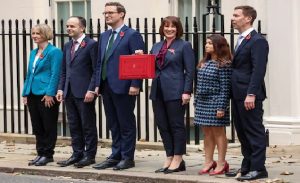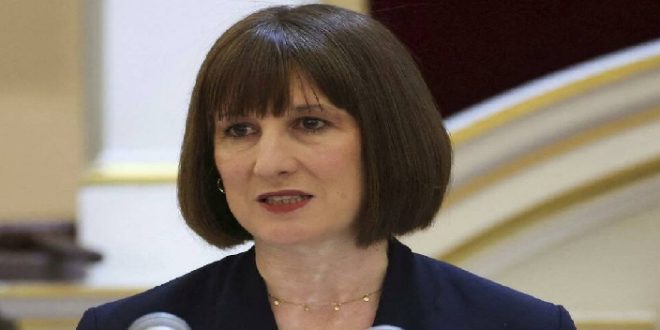16-11-2024
LONDON: Britain’s economy contracted unexpectedly in September and growth slowed to a crawl over the third quarter, data showed on Friday, an early setback for finance minister Rachel Reeves’ ambitions to kick-start a sustained pickup.
Gross domestic product slipped by 0.1% in monthly terms during September as the services sector flat-lined, while manufacturing and construction dropped, the Office for National Statistics said.
 For the third quarter as whole, the economy grew by 0.1%, slowing from 0.5% growth during the second quarter.
For the third quarter as whole, the economy grew by 0.1%, slowing from 0.5% growth during the second quarter.
Economists polled by Reuters and the Bank of England had forecast an expansion of 0.2% in the July-September period, slowing from the rapid growth of the first half of 2024 when the economy was rebounding from last year’s shallow recession.
“Improving economic growth is at the heart of everything I am seeking to achieve, which is why I am not satisfied with these numbers,” Reeves said.
“Now we are going to deliver growth through investment and reform,” she added.
On Thursday Reeves promised a reboot of regulation governing Britain’s “crown jewel” financial industry, which she said had stifled economic growth.
A 1.2% quarterly rise in business investment, which has grown for four quarters, was a bright spot in Friday’s data.
Sterling and British government bonds were little changed after the data.
The opposition Conservative Party said Reeves had talked down the economy too much after Labour won the election by a landslide in July and weak growth was the result.
Last week, the BoE trimmed its annual growth forecast for 2024 to 1% from 1.25% but predicted a stronger 2025, reflecting a short-term boost to the economy from the big-spending budget plans of Reeves.
Britain’s economic output has grown slowly since the COVID-19 pandemic and is up 3% since late 2019.
Only Germany which was also hit hard by surging energy costs after Russia’s invasion of Ukraine has done noticeably worse among the largest advanced economies. “The road ahead remains bumpy,” Sanjay Raja, chief UK economist at Deutsche Bank, said, warning that higher taxes on business announced in the budget could hit private sector investment and hiring early next year.
 “We still see positive momentum into 2025 but downside risks are brewing. Geopolitical risks are on the rise with the spectre of a trade war looming,” Raja said.
“We still see positive momentum into 2025 but downside risks are brewing. Geopolitical risks are on the rise with the spectre of a trade war looming,” Raja said.
Prime Minister Keir Starmer said he wanted the economy to reach annual growth of 2.5% when campaigning for the July 4 election, a rate that Britain has not regularly achieved since before the 2008 financial crisis.
Reeves wants Britain to have the fastest per capita growth in gross domestic product among the Group of Seven advanced economies for two consecutive years.
That ambition looks a long way off, based on Friday’s data.
GDP per head dropped 0.1% in the third quarter and was flat compared with a year ago, meaning it has not grown in annual terms since 2022.
The new British government’s aim to post the fastest sustained economic growth among G7 nations hinges on ranking first for increases in per-capita output for two years running by the time of the next election, a government source told Reuters.
Achieving this target would represent a marked turnaround from Britain’s recent status as one of the G7’s laggards for per-capita GDP growth, having been middle of the pack for much of the 2010s.
It would also likely signify a return to improving living standards, with real per-capita household disposable incomes lower in early 2024 than they were in late 2019. (Int’l Monitoring Desk)
 Pressmediaofindia
Pressmediaofindia




